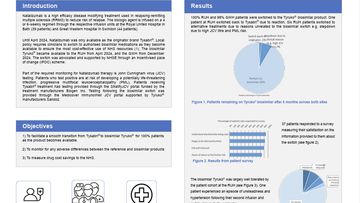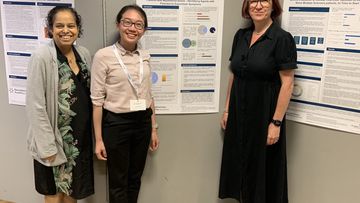The Identification of Inpatient Prescribing Errors on a Neurosurgical Ward of a Large Teaching Hospital
Poster
Aim
This audit compared the medications prescribed on inpatient drug charts to the Trust’s medicine policy. It aimed to identify opportunities for a pharmacist independent prescriber to enhance medication safety for neurosurgical patients.
Headlines
Every year in England, there are 237 million medication errors. Up to 70% of these are made upon admission to hospital.
It is incredibly important to ensure medications are correct, particularly for neuro patients who are often on very specific and complex regimes.
The researchers developed a data collection sheet which was representative of the Trust’s medicines policy, and audited inpatient daily charts between 1 April and 1 May 2021.
A total of 82 newly admitted patients were included in the data, and the number of medications prescribed to each person ranged from one to 21.
Key findings
Across all audited charts, there was no single prescribing parameter that demonstrated 100% compliance to the requirements of the medicines policy.
Areas of drug chart completion that fell below 50% compliance with the policy included:
- Correct patient weight documented (18%)
- Details of any allergic reaction documented (46%)
- Patient provided with VTE literature upon admission (23%)
- All patient identifiers recorded on each page of the drug chart (32% reg meds/27% PRN regs)
- Time of medication prescription (7%)
- Anticoagulants/ antiplatelets prescribed (4%)
- Insulin device specified (0%)
- Correct prescription of insulin dose (50%)
- PRN opioids prescribed as a specific dose (31%)
- Signed discontinuation of medication (27%)
- Dated discontinuation of medication (7%)
Recommendations
Based on the results of the audit, the researchers made the following recommendations:
- The introduction of a formal pharmacy induction for new prescribers at the start of their rotation on the neurosurgical ward
- VTE assessment and documentation training
- Development of a standardised low molecular weight heparin patient leaflet
- Pilot a Pharmacists Independent Prescriber model, in which pharmacist is present at surgical admissions, on the neurosurgical ward
More Neuropharmacy Academy Medication Projects


Developing neuropharmacists, supporting collaborative care
Knowledgeable pharmacists can initiate or support new treatment pathways, play an important role in patient education, medicine adherence, efficacy and safety, and provide advice to other healthcare professionals involved in the person's care. This Academy recognises the value of this essential role, and seeks to enhance pharmacist's clinical skills and build their confidence in managing a range of neurological conditions.